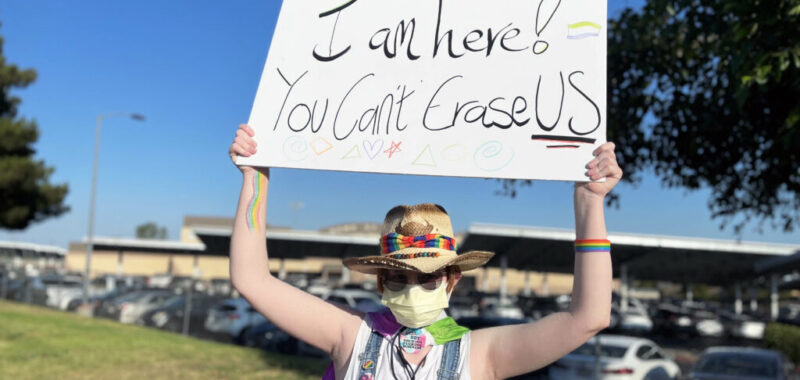
LGBTQ+ community rallies in solidarity, opposing the Social Studies Alive! ban in Temecula Valley Unified in June 2023.
Credit: Mallika Seshadri / EdSource
This week’s executive order by President Donald Trump disingenuously titled “Ending Radical Indoctrination in K-12 Schooling” is a brazen assault on our educational freedoms and civil rights. The order directs the secretary of education and other department heads to develop a plan to terminate federal funds that directly or indirectly support classroom instruction on systemic racism or provide supportive school services and protections to transgender youth.
The order’s sweeping definition of what it calls “discriminatory equity ideology” could lead to a ban on teaching about slavery, segregation, redlining, voter suppression and other historical realities that continue to shape life and opportunity in America today. The order could also result in a ban on ethnic studies, gender studies, queer studies and other rigorous academic disciplines that prepare students to think critically and to live in a multicultural, multiracial society.
Equally troubling is the order’s attack on transgender students and the educators who support them. By directing the attorney general and federal prosecutors to coordinate investigations and prosecutions against educators who provide basic support to transgender students, like psychological counseling, or who use the student’s preferred pronouns, the order puts already vulnerable students at grave risk.
Put this all together and what results is a stunning proposal for a federal takeover of local education, where the president of the United States dictates what local schools can teach and which type of student belongs in our classrooms. It is also another attempt by President Trump and many of his right-wing supporters to purge our nation’s history of uncomfortable truths and erase the lived experience of people of color, women and members of the LGBTQ+ community.
While the potential consequences of this order are staggering to imagine, the most effective way to resist it is clear: Schools, educators and communities should not cave in to threats and intimidation and rush to voluntarily comply with this likely unconstitutional and unlawful order. Stay the course, partner with students, families and community organizations, and resist unless and until the courts have authorized any aspect of these outlandish proposals.
Trump tried something similar and failed in his last days of his first presidential term by issuing Executive Order 13950, which prohibited federal agencies and grant recipients from conducting trainings that included “divisive concepts” such as systemic racism, white privilege and unconscious bias. The order was blocked by a court in Northern California on First Amendment and Fifth Amendment grounds and later rescinded by the Biden administration.
Similar attempts to censor classroom discussion and discriminate against transgender students have also faced legal challenges in states across the country, and most challenges have prevailed. Courts have generally protected local control and academic freedom as essential to democracy and have struck down restrictions on federal funding that essentially coerce states to the point of compulsion. Multiple federal statutes dating back to the founding of the U.S. Department of Education, including the bipartisan-supported Every Student Succeeds Act (ESSA) in 2015, also prohibit federal officials from controlling specific instructional content or curriculum, and expressly leave such decisions to state and local officials.
Even if there are legal setbacks, it will take time, perhaps years, for the courts to resolve these issues. In the meantime, schools have a legal and moral obligation to protect all students and provide an inclusive and honest education. They should stand firm while legal challenges proceed.
But the fight for educational justice belongs to all of us, not just to lawyers — and it requires a broader movement. Students, parents, educators and community leaders must speak out and stand firm against this dangerous attack on our values. Together, we must continue to make the public case for inclusive education. This includes sharing stories of how discussions of history and identity have transformed our classrooms and our life journeys. Documenting the positive and life-saving impact of supporting LGBTQ+ students. Helping parents understand why preparing diverse teachers to work with students of all backgrounds makes education better for everyone. And importantly, we must document the harm this order would cause to students’ educational experiences. These stories and voices — not just legal arguments in court — will ultimately determine whether we can build schools that truly serve all students.
In the meantime, stand firm, keep supporting all students and continue teaching truth.
•••
Guillermo Mayer is president and CEO of Public Advocates, a nonprofit law firm and advocacy organization that challenges the systemic causes of poverty and racial discrimination by strengthening community voices in public policy and achieving tangible legal victories advancing education, housing, transportation equity and climate justice.
The opinions expressed in this commentary represent those of the author. EdSource welcomes commentaries representing diverse points of view. If you would like to submit a commentary, please review our guidelines and contact us.

